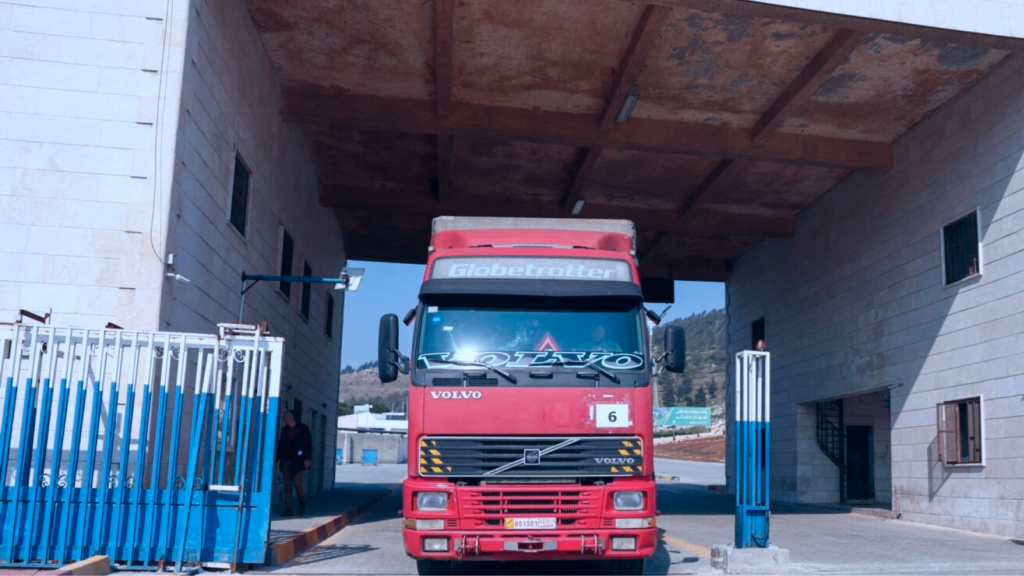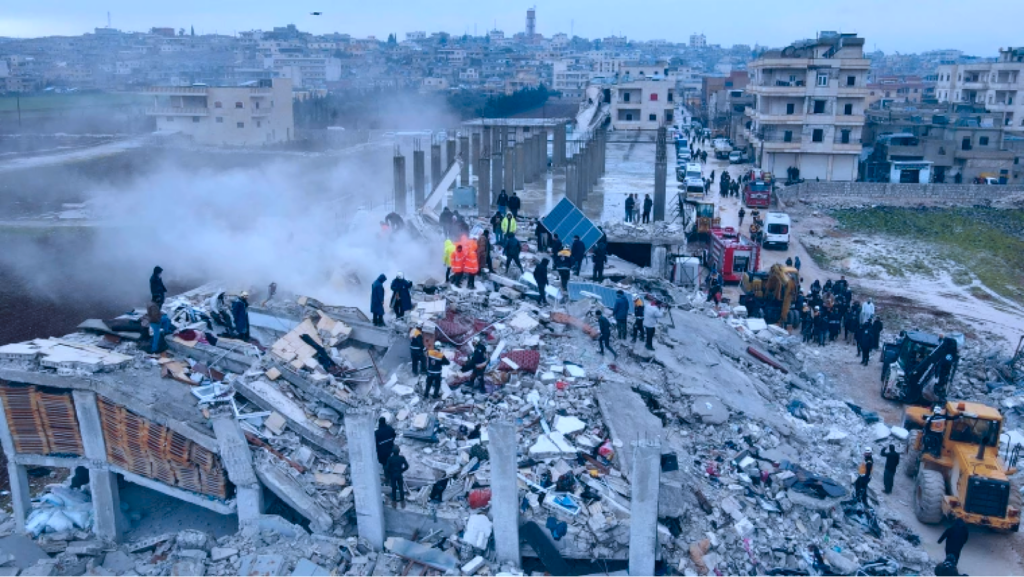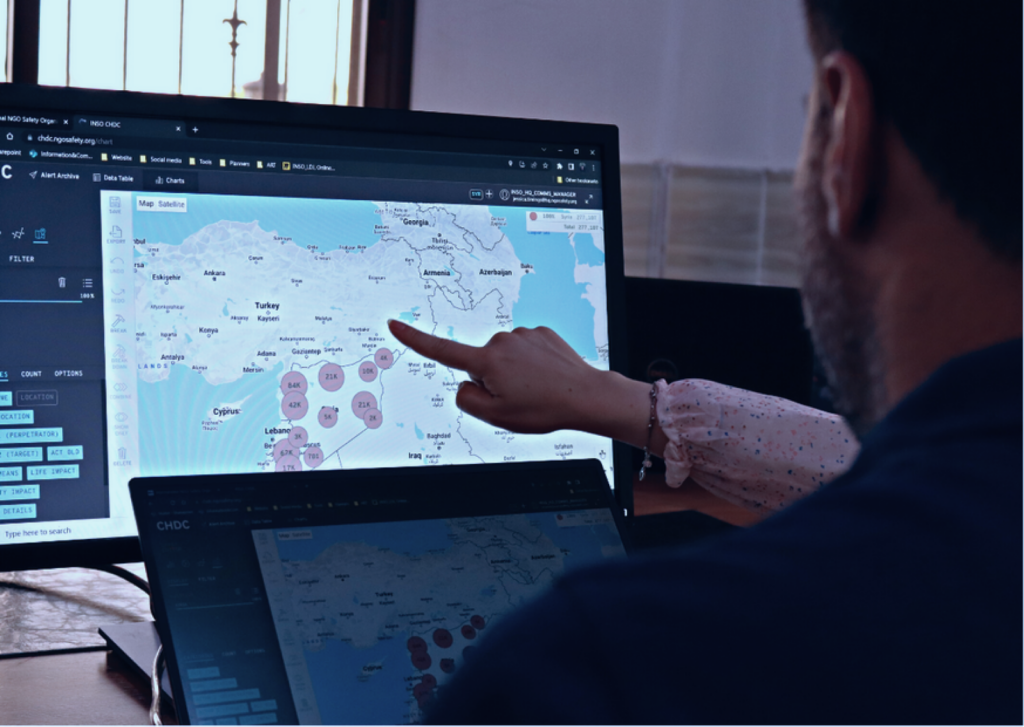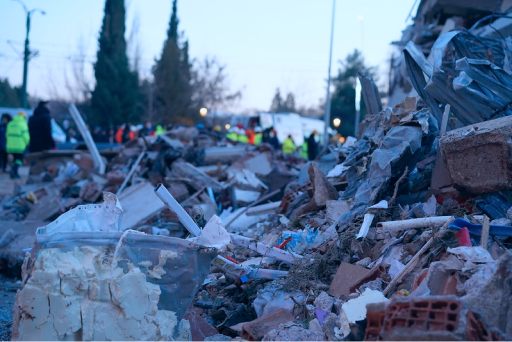Just after 4 am local time on Monday 6 February 2023, a 7.8 magnitude earthquake struck southeast Turkey near the northwestern border of Syria. Another 7.7 magnitude earthquake struck that afternoon, followed by several large aftershocks.
In Syria alone, 8.8 million people are estimated to have been affected. The most impact has been felt in the northwest, a region already facing significant humanitarian needs.
Northwest Syria is also a hub for humanitarians, many of whom were themselves directly affected by the earthquakes. A country director of an international NGO says they were in Gaziantep in Southern Turkey when the first earthquake hit:
“It’s the first time I’ve experienced such a serious earthquake and right at the deep end. Obviously, my primary focus was really thinking about our staff who were inside Syria the at the time.”
The director immediately reached out to their team and was able to confirm that everyone was safe and accounted for. Sadly, this was not the case for all organisations. According to the United Nations, 92 NGO staff were killed, including 26 colleagues from one international organisation alone.
Access & operations challenges during emergency response
In the first days and weeks, a clear picture of the scope and scale of this event was difficult to grasp.
“Many humanitarian organisations struggled to obtain similar information on the infrastructural and humanitarian impact of the earthquake from Northwest Syria,” says an international staff member of a humanitarian organisation based in Damascus, Syria.
Several factors influenced this, including that no international United Nations (UN) or NGO staff were permanently based in this region, while their operations – and that of their local partners – were directly impacted. The same impact on local communities was felt by humanitarian organisations: staff casualties and physical injuries, power cuts and loss of telecommnications, damaged roads and buildings, and the destruction of homes of staff in affected areas.
Another challenge in this response was navigating cross-border operations from Turkey into Syria. Cross-border assistance is highly politicised. Currently, there is one UN-managed crossing, Bab Al-Hawa, which was inoperable for several days due to road damage. Two other crossing points were opened for a three-month term to facilitate aid access.

Aid is transported into Syria at the Baba Al-Hawa crossing. CREDIT: VOA
With such a complex access context, INSO partners rely on our analysis as well as risk, area and route assessments and targeted briefings to prepare for and anticipate developments related to the overall conflict and broader dynamics, cross-border access, operational impediments and constraints. Alongside partners, our team has also been analysing scenarios related to UN Security Council resolution governing cross-border operations.
“We are definitely engaged with INSO on the resolution, it feels like we’re in almost daily contact,” shares an advisor of an INSO donor who supports humanitarian work in the region. “The updates and reports I receive are excellent, with significant detail and very good analysis, and the scenario planning exercises have also been extremely helpful.”
Monitoring safety & conflict dynamics
With such extraordinary humanitarian needs, many organisations – including some that had never worked in Syria before the earthquake – moved to help. But while conflict dynamics that had been present in the region before the earthquake somewhat dulled as those actors also took steps to support affected communities, insecurity was not gone.
As Fadel Saleh, INSO Safety Advisor for North Syria explains, the post-earthquake context presents several risks for humanitarians.
“The aftermath of the earthquake has witnessed a rise in crime, community insecurity and intercommunal tensions, heightened risks of renewed inter-OAG violence, and attempts by some actors to the conflict to politicise the crisis as well as the geopolitical developments related to the earthquake diplomacy that was observed at play,” Fadel says.
“These factors underscore the need for a conflict-sensitive, coordinated, comprehensive and responsible humanitarian response.”

A search operation continues in a collapsed building. CREDIT: White Helmets
INSO’s platform monitoring Syria was active before, during and after the earthquake to keep humanitarians informed of issues on the ground that could impact their operations. The same humanitarian organisation staff member says that, especially in the first few weeks following the earthquakes, INSO was one of the main sources of information on the humanitarian, security and political context.
“Alongside valuable reporting from OCHA, REACH, and others who are more narrowly focused on the humanitarian situation, INSO was probably the only organisation producing pieces of consolidated information on not only the humanitarian but also the political and security situation, collected from a variety of open sources and reports from the ground. They were valuable for our organisation’s response, especially in the first weeks, enabling us to get a better grip of the situation on the ground.”
Supporting a better-informed & coordinated response
In the wake of such a massive emergency, accurate and verified information can be difficult to find and coordinating humanitarian efforts can be challenging.
To support coordination and information sharing, INSO not only produced timely reports but also hosted special roundtables for partners. During these meetings, security, access and geopolitical implications were discussed, allowing partners to better coordinate and build a shared understanding of the situation.
For the director and their NGO which focuses on direct engagement with actors, INSO’s information helped not only in understanding how these actors had been affected but also to get a wider perspective on the situation.
“Because INSO takes a much wider perspective, this is also helpful when we are thinking about long-term priority areas of intervention. INSO helps to provide a complementary understanding of some of the challenges.”

INSO staff examine a map of incidents in Syria in the Conflict & Humanitarian Data Centre.
Looking ahead
In the aftermath of this devastating earthquake, these partners agree INSO’s team played a crucial role in the response efforts. As the situation began to stabilise, INSO continued to engage in discussions with partners about the security, political and humanitarian implications of the earthquake for Syria and the region. These kinds of conversations allowed NGOs and humanitarian organisations to compare views and discuss scenarios, ultimately leading to a strengthened collective understanding of the context.
Of course, INSO was also affected by this extraordinary event. But even though several of our own staff were personally affected by the earthquake, the entire team demonstrated dedication and professionalism. The team continued to provide services and to support the response efforts, which was recognised by partners.
“We know that INSO’s staff have been impacted as well,” the advisor adds. “So in incredibly difficult circumstances, they’ve still been able to churn out the reports and the analysis and the presentations and do the round tables.”
This response, like many before, highlighted how important collective understanding is for NGOs to have a coordinated and cohesive response to emergencies. INSO will continue to draw from these experiences to further strengthen its ability to provide essential support during crises and disasters around the world.
As for this response, a UN staff member working in Damascus says that INSO’s effort exemplified humanitarianism: “I got the impression that INSO Syria was sharing every piece of information they had available. In this sense INSO was extremely generous with their resources following the earthquake, evidencing a true humanitarian spirit.”
Want to be part of INSO? Work with us
INSO in Syria is gratefully funded by the European Commission (ECHO), the United Kingdom’s Foreign, Commonwealth and Development Office, USAID’s Bureau of Humanitarian Assistance, German Ministry of Foreign Affairs, Swiss Agency for Development and Cooperation and Global Affairs Canada.

